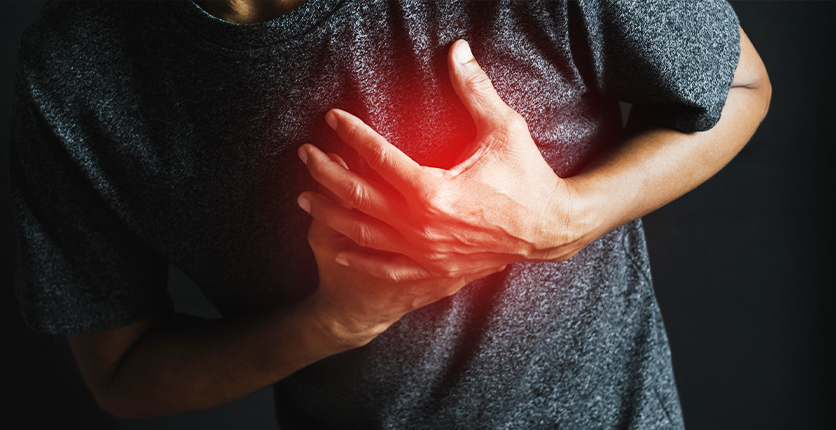Cardiovascular disease is the leading cause of death globally. According to the World Health Organization, the disease takes an estimated 17.9 million lives each year; of these deaths, 85% were due to heart attack or stroke.
In Singapore, 23 people die from cardiovascular disease (heart attack and stroke) every day. Last year, 30.9% of deaths – or one out of three deaths – could be attributed to heart diseases or stroke.
Cardiovascular disease killed more men than women in 2023 – 14,703 compared to 12,182.
There’s no better time than World Heart Day on 29 September to learn more about this top killer, from the factors that cause or contribute to it, to signs you may have heart disease and ways to minimise your risk of developing it.
Here’s what you should know.
1. Cardiovascular disease encompasses various conditions

Cardiovascular disease is a collective term for diseases of the heart and blood vessels. The most common types include coronary artery disease, high blood pressure (hypertension), cardiac arrest, congestive heart failure, arrhythmia (irregular heartbeat), stroke, congenital heart disease, and peripheral artery disease.
If you are 35 years old and under, you can get screened for risk factors of heart disease, says Associate Professor Phillip Wong, Specialist in Cardiology and Consultant, Raffles Heart Centre. These risk factors include hypertension, diabetes, and high cholesterol.
In people aged 55 and above, Assoc Prof Wong says that there is an increasing trend of cardiac arrhythmias, the most common of which is atrial fibrillation.
“In men aged 40 and older, and in women of post-menopausal age, the most common heart disease is coronary artery disease (CAD),” he adds.
2. Heart disease may show up in different ways

Heart disease may present with these symptoms, says Assoc Prof Wong:
- The most common symptom is chest pain. Chest pain is typically exertional in nature – this means that its effect is worse when walking faster or up the stairs.
- The second most common symptom is heart palpitations, which may be a sign of cardiac arrhythmia such as atrial fibrillation.
- Another common symptom is your smart watch detecting some form of cardiac arrhythmia like atrial fibrillation.
3. Signs your chest pain is a heart attack

Chest pain is the main symptom of a heart attack. Assoc Prof Wong describes this symptom in greater detail:
- It occurs suddenly, even if you’re at rest. It can occur during your sleep as well.
- It’s described as “compressive” or “squeezing” in nature.
- It occurs in the centre of the chest, not in the left or right side.
- The pain may be associated with cold sweats.
- The pain can radiate up to the jaw (very common) or to the back, and down the insides of the arms.
- It cannot be relieved with gastric medication or other pain killers.
If you experience these symptoms, Assoc Prof Wong says to call an ambulance or go to your nearest hospital emergency department immediately.
4. You’re never too young to start looking after your heart

Many of us associate heart disease with middle age or old age, and as such, may only start paying attention to our heart health when we’re in our 50s or 60s.
But did you know that younger men are about three times more at risk of developing CAD than their female counterparts of pre-menopausal age? Women have a particular advantage over men because female hormones have a protective effect on their heart.
After menopause, however, women’s risk catches up with that of men, and if they do develop CAD, it tends to have poorer outcomes compared to men, Assoc Prof Wong says.
So, don’t wait until you’re middle-aged to start taking care of your heart. Even if you’re in your 20s or 30s, you should make it a point to adopt heart-healthy lifestyle habits and get regular health screenings.
5. You can lower your risk of cardiovascular disease

Men should screen for risk factors such as hypertension, high cholesterol, and diabetes from the age of 30, says Assoc Prof Wong.
If you smoke, he advises you to stop smoking, as this is a risk factor that is strongly associated with CAD.
You should also adopt healthier lifestyle habits, such as:
Eating a healthier diet. Your diet should be:
- High in fibre (50% of each meal)
- Low glycaemic index (GI), meaning that it should not raise your blood sugar levels quickly. Low-GI foods include oats and other whole grains like quinoa and brown rice, legumes and beans, starchy vegetables like corn and sweet potatoes, and most fruits
- Low in red meats like pork, beef, and lamb
- Low in processed foods, such as convenience meals, fast foods and canned foods
It’s also important to lower your salt (sodium) intake. Assoc Prof Wong says that only 2g of salt is required per day, however Singaporeans generally consume twice this amount. He recommends avoiding soups and gravies that are high in salt and easily absorbed into your system.
Additionally, make sure you maintain a healthy body weight, because obesity is a big risk factor for developing heart disease. Assoc Prof Wong says that a Body Mass Index (BMI) of 23 or less is ideal.
“Finally, live an active lifestyle, taking at least 6,000 steps per day, or even 10,000 steps, if possible, which is equivalent to between 5km and 6km,” he continues.
Learn how to spot hidden sodium in food and reduce your intake.
6. Take care of your mental health

Assoc Prof Wong says that while stress and depression are not causes of heart disease, they can lead to the poor management of risk factors and an unhealthy lifestyle. For instance, if you’re depressed, you may be more likely to seek comfort in foods that are high in fat, sugar and sodium, all of which may contribute to your risk of obesity and hypertension, which are major risk factors for heart disease. Likewise, if you’re stressed, you may have trouble sleeping, and poor sleep is also associated with a higher risk of heart disease.
Stressful situations can also trigger heart attacks, Assoc Prof Wong adds.
7. Get sufficient quality sleep every night

“An important factor for good heart health is good rest and hence adequate sleep, paired with an active lifestyle,” says Assoc Prof Wong.
“Poor sleep can lead to poor preventive habits for heart disease and a sedentary lifestyle.
“Another issue for poor sleep, which includes feeling tired and sleepy the following day, is a condition called OSA (obstructive sleep apnoea). This condition is common in Singapore and is associated with a poor control of hypertension and other risk factors.”
Fortunately, OSA can be treated. Assoc Prof Wong says that if you have symptoms of poor sleep, such as waking up in the middle of the night with breathlessness or loud snoring, you should consult your doctor to get tested for OSA.
Read on for more tips on how to sleep soundly and get a better night’s rest.
Note: Please consult your GP or physician on managing your cardiovascular health.
SAFRA members enjoy member rates on health screenings at Raffles Medical clinics. For more details, click here.
For the full list of healthcare benefits, go to safra.sg/promotions/
Want more articles like this, and other lifestyle content right in your inbox? Download the new SAFRA mobile app and opt in for the eNSman Newsletter – you don’t need to be a SAFRA member to subscribe – and never miss another story!









